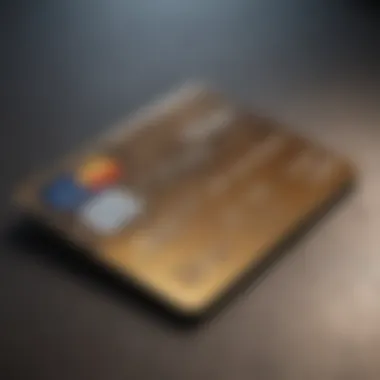Withdrawing Money from a Secured Credit Card: Key Insights


Intro
Withdrawing money from a secured credit card may seem straightforward, but it involves several important factors. Understanding how secured cards function is essential for anyone contemplating this action. Secured credit cards can assist in rebuilding credit, yet they come with specific limitations and implications for accessing funds. This guide aims to equip readers with the knowledge necessary to navigate the complexities involved in using a secured credit card.
Understanding Credit Status
What is Credit Status?
Credit status refers to an individual's financial reliability as assessed by credit reporting agencies. It reflects how well a person manages their credit obligations. Having a good credit status is crucial for obtaining favorable loan terms, credit cards, and even renting a home.
Key Factors Affecting Credit Scores
Several elements influence credit scores:
- Payment History: Timely payments contribute positively, while late payments harm your score.
- Credit Utilization: This measures the amount of credit being used compared to the total available credit. Lower utilization rates are better.
- Length of Credit History: Longer credit histories can boost scores, showing responsible credit use over time.
- Types of Credit: A mix of secured and unsecured credit can enhance your score.
- New Credit Inquiries: Numerous inquiries can signal risk, potentially lowering your score.
Importance of Knowing Your Credit Reports
Monitoring your credit report is vital. Errors can negatively affect your score and financial opportunities. Knowing what lenders see can help you address potential issues proactively.
How to Obtain Your Credit Reports
You can access your credit reports for free once a year from each of the major credit reporting agencies: Experian, TransUnion, and Equifax. Websites like AnnualCreditReport.com provide a convenient way to access these reports. It is wise to check reports for inaccuracies or unfamiliar accounts, allowing you to dispute errors as necessary.
Implications of Withdrawing from a Secured Credit Card
Withdrawing cash from a secured credit card often comes with restrictions. Here are key points to consider:
- Cash Advance Limits: Many secured cards impose a cash advance limit that can be lower than your overall credit limit.
- Fees: Cash advances usually incur high fees, and interest rates for withdrawals are often higher than for purchases.
- Impact on Credit Utilization: Taking out cash can alter your credit utilization ratio, which may negatively impact your credit score.
Alternative Methods for Accessing Funds
If withdrawing money from a secured credit card proves disadvantageous, consider other methods:
- Personal Loans: These often come with lower interest rates and extended repayment terms.
- Peer-to-Peer Lending: Platforms like LendingClub offer personal loans funded by individual investors.
- Overdraft Protection: Check if your bank offers protection plans that could cover short-term necessities without high fees.
Actionable Insights and Next Steps
- Evaluate Your Needs: Determine if withdrawing from a secured card is necessary vs. other options.
- Plan Ahead: Always consider the terms and implications of any financial decision.
- Educate Yourself: Continually seek resources related to credit management.
Ultimately, being informed about the workings of secured credit cards can lead to better financial decisions. Make sure to consider both the immediate and long-term consequences before proceeding.
Understanding Secured Credit Cards
Secured credit cards serve a specific purpose in the realm of personal finance, particularly for individuals with limited credit history or those looking to rebuild their credit scores. In this section, we explore the nuances of secured credit cards, discussing their structure, operational mechanics, and typical applications.


Definition of Secured Credit Cards
Secured credit cards are financial products that require the cardholder to place a cash deposit as collateral. This deposit typically equals the credit limit, thereby securing the lender against potential losses due to non-payment. Unlike traditional credit cards, which are granted based on one’s creditworthiness, secured cards provide access to credit to those who might otherwise struggle to qualify. They can be an effective tool for credit building when used responsibly.
How Secured Credit Cards Work
Once the initial deposit is made, the secured credit card functions similarly to a regular credit card. The cardholder can make purchases up to the credit limit, and payments made towards the balance may reflect positively on their credit report. However, it's essential to understand that failing to pay the balance on time can lead to high-interest charges and could also result in the forfeiture of the deposit. Most secured cards report to the major credit bureaus, making them a strategic choice for building or repairing a credit history.
Common Uses for Secured Credit Cards
Secured credit cards can serve various purposes in an individual's financial life:
- Building Credit: They are often used by those aiming to establish a credit history or repair a damaged one.
- Managing Budget: Cardholders can only spend what they have deposited, making it a helpful tool for managing budget concerns and preventing overspending.
- Online Transactions: Secured cards can be used for online purchases, which is convenient for many people.
- Emergency Expenses: They can provide a buffer for unexpected expenses without the risk of falling into debt beyond one's means.
When considering a secured credit card, users should weigh these benefits against any fees or restrictions that may apply.
Can You Withdraw Cash?
Withdrawing cash from a secured credit card is an important topic to discuss. It is essential to understand the capabilities and limitations involved. Many users might think they can access cash just like with a regular credit card. However, there are unique factors at play with secured credit cards that need careful consideration. Understanding these elements can help individuals make informed financial decisions and avoid unexpected fees.
Withdrawal Capabilities of Secured Credit Cards
Secured credit cards often allow for cash withdrawals, but this function is not universally applicable. The ability to withdraw cash is typically determined by the policies of the issuing bank or financial institution. Secured credit cards usually operate like standard credit cards but have a cash advance feature that the cardholder can use. When you withdraw cash from a secured credit card, you are actually taking a cash advance against your credit limit.
This cash advance can be accessed through an ATM or bank. It is crucial to ensure that the card is linked to an account that permits cash withdrawals. Not all secured cards might offer this option, so it is important for cardholders to check the terms of their specific cards. The key point to remember is that while accessing cash is possible, it often comes with drawbacks, such as fees and higher interest rates.
Cash Advance Limitations
Cash advances from secured credit cards come with significant limitations. First, there is usually a cash advance limit that is lower than the total credit limit for the card. This means that even if a user has a large total limit, only a portion may be available for cash withdrawal.
Here are some common limitations:
- Higher Interest Rates: Typically, cash advances attract a higher interest rate than regular purchases. Interest starts accruing immediately, without a grace period.
- Transaction Fees: Users may incur a fee for every cash advance taken. This fee can range from a fixed amount to a percentage of the advance.
- Limited Acceptance: Not all ATMs may accept secured credit cards for cash withdrawals, leading to inconvenience.
- Impact on Credit Utilization: Taking a cash advance can negatively affect the credit utilization rate, a significant factor in credit scoring.
These limitations highlight the need for users to evaluate whether using a secured credit card for cash withdrawals is the best option for their financial needs. It’s recommended to consider alternatives before deciding to take a cash advance.
Process of Withdrawing Money
Withdrawing money from a secured credit card is a critical focus in this article. Understanding this process allows cardholders to manage their finances effectively while making informed decisions. The importance lies in knowing that secured credit cards are not designed primarily for cash withdrawal. However, there are provisions to enable such transactions under certain circumstances. Awareness of these elements, including fees and limits, can benefit those who decide to utilize this feature. One must also consider the broader implications for financial health and the impact this decision can have on one’s credit score.
Steps to Withdraw Funds
Withdrawing funds from a secured credit card involves a few essential steps. These steps pave the way for a prompt and efficient cash withdrawal while ensuring that the user remains informed.
- Review Your Credit Card Agreement: Before initiating a withdrawal, it is crucial to understand the terms and conditions outlined in your credit card agreement. This contains vital information on withdrawal limits and potential fees.
- Locate an ATM: Find an ATM that accepts your secured credit card. Not all ATMs allow withdrawals from secured cards, so ensure to verify this before proceeding.
- Insert Your Card: With the ATM in front of you, insert your secured credit card. Follow the on-screen instructions.
- Enter Your PIN: You will need to enter the Personal Identification Number (PIN) associated with your secured card. If you do not have a PIN, contact your card issuer for guidance.
- Select Withdrawal Amount: Choose the amount you wish to withdraw, making sure it does not exceed your cash advance limit.
- Complete the Transaction: Confirm the transaction. The ATM will dispense the cash, and you should keep the receipt for your records.
Identifying ATM Accessibility


Knowing where and how to access ATMs is crucial for those looking to withdraw money from secured credit cards. Not every ATM can handle secured credit card withdrawals, hence determining accessibility is important.
- Bank Network: Many banks that issue secured credit cards also provide an extensive ATM network. Utilize these ATMs as they usually accept withdrawals from your secured card.
- Third-party ATMs: Some third-party ATMs may allow you to withdraw cash using your secured credit card. However, they may charge higher fees. Always check the ATM's acceptance policy.
- Online Resources: It is advisable to utilize online platforms to find ATMs that enable cash withdrawal from secured credit cards. Websites or mobile apps related to your bank can provide a map of nearby ATMs.
Understanding these aspects will enhance the experience of withdrawing cash and may alleviate potential issues during the process.
Financial Implications
Understanding the financial implications of withdrawing money from a secured credit card is crucial for anyone considering this option. Many users may not realize that while a secured credit card provides a manageable way to build credit, it also carries certain costs and risks associated with cash withdrawals. Being informed about these implications can help users make sound financial decisions and avoid pitfalls.
Understanding Fees Associated with Cash Withdrawals
When you withdraw cash using a secured credit card, it is essential to be aware of the fees involved. These fees can significantly reduce the amount of cash you actually receive. Some common fees include:
- Cash Advance Fee: This is typically a percentage of the cash advanced or a fixed fee, whichever is greater. Depending on the card, this fee can range from 3% to 5%.
- ATM Fees: If you withdraw cash from an ATM that is outside of your card's network, there could be additional fees charged by the ATM operator.
These fees collectively can add up quickly, making cash withdrawals a costly endeavor. It’s prudent to check your secured credit card agreement for specific details on fees before proceeding with a cash withdrawal.
Interest Rates on Cash Advances
The interest rate on cash advances from secured credit cards can be different from regular purchase rates. Typically, cash advances incur a higher interest rate than everyday purchases. Interest begins accruing immediately and does not come with a grace period. This means that the moment you withdraw cash, interest starts to pile up.
- Higher Interest Rates: Many secured credit cards have cash advance rates that are considerably higher. For example, if your standard purchase APR is around 15%, the cash advance APR could be 25% or more.
- Accumulation of Interest: If you do not pay off the cash advance quickly, the total amount owed can grow significantly. This factor necessitates careful consideration before withdrawing cash.
In summary, it is vital to grasp the fees and interest rates associated with cash withdrawals from secured credit cards. Withdrawing cash can lead to higher costs than anticipated, impacting your overall financial health in the long term.
Alternatives to Withdrawing Cash from Secured Credit Cards
Withdrawing cash from a secured credit card can come with various limitations. Therefore, exploring alternatives may be beneficial. These alternatives not only help safeguard your credit score but also promote healthier financial habits. Understanding the options available allows cardholders to navigate their finances more easily.
Using a Secured Credit Card for Purchases
Instead of withdrawing cash, you can utilize a secured credit card directly for transactions. Secured credit cards are designed to be used like regular credit cards. The funds available on the card are typically tied to a cash deposit you made when opening the account. When you make purchases, you are using the credit from your secured card rather than withdrawing cash. This method helps build your credit history without incurring additional fees associated with cash advances.
The benefits of this approach are numerous:
- Building Credit: Regular use and on-time payments can enhance your credit score over time.
- Avoiding Fees: Many secured credit cards have lower transaction fees compared to cash withdrawals.
- Tracking Expenses: Purchases made with a card can be easily tracked, aiding in budgeting.
Exploring Personal Loans
Personal loans can be an alternative to cash withdrawals for urgent financial needs. They can often provide more substantial amounts than what a secured credit card allows. When you apply for a personal loan, you will need to show your creditworthiness and provide necessary documentation.
Consider these key aspects of personal loans:
- Fixed Interest Rates: Many personal loans offer fixed rates, making repayment more predictable.
- Flexible Terms: You may select terms that best suit your financial situation, often ranging from one to five years.
- Larger Amounts: Personal loans can cover larger expenses such as medical bills or home repairs beyond the limit of a secured card.
Consideration of Peer-to-Peer Lending


Peer-to-peer lending is another alternative worth considering. This method connects borrowers directly with individual lenders who are willing to provide funds. It can offer lower interest rates and more flexible repayment options than traditional bank loans.
Key points to notice include:
- Faster Funding: Often, peer-to-peer platforms can disburse funds quicker than banks.
- Less Stringent Requirements: Some platforms may not require the same credit score criteria as traditional institutions.
- Variety of Loan Options: Borrowers can find loans tailored to their specific needs.
Overall, while withdrawing cash from a secured credit card is possible, considering these alternatives can lead to better long-term financial health. Avoiding cash withdrawals can mitigate potential fees, allowing better control of your finances.
Considerations Before Withdrawing
Withdrawing money from a secured credit card can seem like an appealing option in times of need. However, before proceeding, it is crucial to consider various factors that may affect your financial situation in both the short and long term. These considerations can be pivotal in determining whether this action is favorable for you. Understanding the impact on your credit score and the overall financial health is necessary to make an informed decision.
Impact on Credit Score
When you withdraw cash using a secured credit card, it can have immediate effects on your credit score. The amount you withdraw will typically count against your credit limit, raising your credit utilization ratio. A high credit utilization ratio can negatively affect your credit score. Financial experts often recommend keeping this ratio below 30%.
Here are some points to consider regarding credit score impacts:
- Increased Utilization: Cash advances raise your utilization, potentially lowering your score.
- Public Records: Late payments or defaults can be reported, severely affecting your credit history.
- Hard Inquiries: If you apply for a new credit line afterward, inquiries may further impact your score.
These elements may create a challenging cycle of credit dependence. Evaluating your current credit status before tapping into your secured credit card’s cash capabilities is highly recommended.
Long-Term Financial Health Considerations
The decision to withdraw money from a secured credit card is not merely a one-time event; it can have lasting effects on your financial health. There are several crucial factors to ponder:
- Debt Accumulation: Cash advances may lead to debt traps if not managed properly. The escalating interest rates on these withdrawals can compound your existing financial burdens.
- Budget Impact: Factor in how cash withdrawals will influence your overall budget. If acquiring cash leads to overspending, it can erode your financial position gradually.
- Alternatives: Assess other options before pulling funds. Personal loans or peer-to-peer lending may provide better terms and less financial strain.
Ultimately, the implications of withdrawing from a secured credit card should not be overlooked. The fact that it may seem like an immediate solution does not negate potential long-term adverse effects on your financial landscape.
Remember, being informed can steer you towards better financial decisions.
Culmination
Understanding the intricacies of withdrawing money from a secured credit card is crucial for all users. This last section synthesizes the key points discussed throughout the article while emphasizing essential elements that can significantly impact your financial health.
Secured credit cards provide a means to build or improve credit scores while offering a level of control through a cash collateral deposit. However, the ability to withdraw cash should not be taken lightly. It comes with costs and considerations that could affect your overall financial strategy.
Being aware of fees, interest rates, and cash advance limitations is vital. These factors can influence how much you really gain from making a withdrawal. In addition, one must consider the potential impact on credit scores, especially when cash advances could signal financial distress to creditors.
Benefits of Understanding Cash Withdrawals:
- Informed Decision-Making: Recognizing the fees and long-term costs helps in making better choices about when to withdraw.
- Credit Management: Knowledge of how the withdrawal can affect your credit score allows for better planning.
- Long-Term Strategy: It is essential to weave the knowledge into your financial health strategy, ensuring sustainable use of credit resources.
Ultimately, navigating the complexities of secured credit cards and their cash withdrawal features requires diligence and education. This article aims to provide you with the necessary tools and insights to make informed decisions.
"The ability to withdraw funds from a secured credit card is often viewed as a financial safety net, but understanding the costs and implications can transform it from a risk into an opportunity."
Final Thoughts on Secured Credit Cards and Cash Withdrawals
Withdrawal capabilities from secured credit cards serve a distinct purpose. While they can offer quick access to funds in emergencies, the accompanying costs may outweigh the benefits. Proper use of a secured credit card involves looking beyond immediate gains and making sure that you weigh long-term implications. Consider using these cards primarily to build credit rather than rely on them for regular cash access. Cultivating a strong financial footing requires a balance between usage and understanding.
In closing, being aware of the limitations and fees associated with withdrawing cash can empower users to manage their finances more effectively. Careful planning and informed choices pave the path toward financial health.







